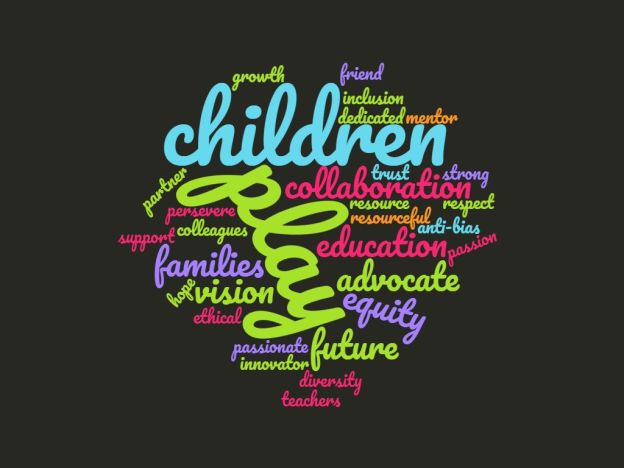 3 Heartfelt Learnings:
3 Heartfelt Learnings:
While in this program I learned a great deal about the field of early childhood and myself. I started this journey when my children were 1 and 3 (now almost 4 and 5) and have learned so much that has helped me as a parent to better understand my children, their teachers, and their early childhood programs. Probably my biggest takeaway is that one person/one voice CAN make a difference. Before starting this course, I did not see how realistic it is to address a challenge in early childhood, but I feel much more capable now. I have an understanding of the process of evaluating the history, current context, consequences – intended and unintended, involving others, and setting objectives, and then putting the plan into action. No matter how small your role in early childhood, you can make a difference – whether by supporting/encouraging a parent or family, loving a child and creating a strong relationship, preparing them for school, appreciating each child for who they are. Every day we have the ability to be a positive influence on the life of a child and it is up to us to make the most of every opportunity we are given.
Another learning is the value of a Community of Practice (COP). I had never heard of them before specific to early childhood and now realize how beneficial they are to early childhood professionals. In the same context, the importance of having experts and novices come together to learn and grow, to problem-solve and challenge one another – I believe this is invaluable. There is power in numbers and this is a way to create awareness and disseminate knowledge among the field and its professionals.
Microagressions are another topic that really resonated with me in this program. We are all likely guilty of them in some fashion, but it was eye opening to realize how frequently they occur. Despite most people’s intentions being harmless, microaggressions still have the potential to inflict a lot of damage. Learning about them has made me more aware of my thoughts and words and how they impact others, and also in observing those around me. Especially in ensuring that I am not speaking any microaggressions to or in front of children, as that may negatively affect their view of themselves or others.
Long-term goals:
My biggest long term goal from the program is to never stop learning and to advocate for children and their families in every role that I am in, whether in the field or not. I want to become involved in professional organizations such as NAEYC, attend conferences, find a Community of Practice in my area, and continue to grow and develop myself as a professional. I want to learn more about grant writing and become more proficient, as I believe funding is a critical challenge to early childhood. There are many opportunities for grants out there, and I want to learn how to position my organization to be eligible for them.
To my colleagues:
We have made it to the finish line! It has been a wonderful adventure together and I am thankful for each one of you. You inspire me with all you do and your commitment to loving, protecting, educating, serving, and giving to children and their families. I appreciate your feedback, encouragement, and comments and will miss our discussions and hearing about your passions and how you are fighting to make a difference in early childhood. We have grown together and individually and now it is time to take action as influencers and change makers in our communities. Thank you for challenging me to better myself and expand my thinking and for all the lessons I have learned over the past 2 years.
I cannot believe that the end is finally here…I have been waiting for what seems like so long, but now that we are wrapping up, it is hard to believe that we are done. We have all reached the end with different paths – facing different challenges and overcoming personal and professional obstacles, but we did not give up and made it together. I will be at the commencement in Tampa, FL next January and would love to see any of you there.I wish you all the best and look forward to reading about you in Walden’s Alumni magazine in the future about how you are making a difference!
To my instructor, Dr. Ernst:
Thank you for your wisdom in the courses I have had with you throughout this program. I enjoyed watching the videos you created to give us an inside look at families in the early childhood and the importance of establishing relationships with them. You give helpful feedback and I appreciate your heart for teaching others and sharing your passion for early childhood. You inspire me to keep moving forward and to stretch myself and my thinking, and I thank you for that.
I can be reached at beautifuldisaster623@gmail.com in the future or on Facebook.
Best Wishes,
Amanda Linser, M.S.